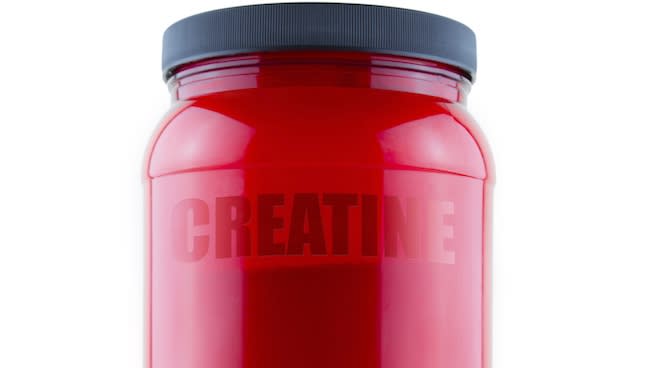The Positive Side Effects of Creatine (Besides Building Muscle)

Photo: Thinkstock
I would like to preface this article by stating that I support the whole food approach to fueling and do not advocate for supplementation. That being said, as a registered dietitian, I do like to provide athletes with sound scientific nutrition information to keep them abreast of cutting edge research.
When we think of creatine, most of us probably think of the powdered stuff athletes scoop into their shaker cups. But creatine is naturally found in meat and fish. The research shows that supplemental creatine is generally safe and effective, proving "greater gains in fat/bone-free mass, isotonic lifting volume and sprint performance"—likely due to fluid retention and protein synthesis. It works by promoting intramuscular formulation of creatine phosphate, which allows for the production of adenosine triphosphate (ATP), an energy source in the body.
But there could more to this intriguing supplement. New research shows that side effects of creatine may be beneficial to heart, brain and bone health.
RELATED: Benefits of Coffee For Athletes
Positive Side Effects of Creatine
Heart Health
Preliminary research suggests that creatine may help lower levels of homocysteine, a biomarker for heart disease. The University of Maryland Medical Center reports that people with heart failure who took creatine in addition to receiving standard medical care, were able to increase the amount of exercise they could do before becoming fatigued, with fatigue being one of the major symptoms of heart failure. Those people also experienced an increase in body weight and improvements in muscle strength.
Brain Health
Research was conducted to study the effects of creatine supplementation in vegans and vegetarians. It showed significant improvement in cognitive function—increased IQ scores and the ability to repeat longer sequences of numbers from memory. Supplementation of creatine in the elderly population also showed improvements in spatial short-term memory. This is likely due to the fact that the brain uses creatine for ATP production, which is needed for normal cognitive performance.
RELATED: Powerful Vegetarian Recipes
Bone Health
Researchers noted improved lean body mass and improved bone mineral density in a study testing the effects of creatine and bone health, during which subjects performed resistance training. As we age, there is a natural reduction in bone mass, and aside from physical activity and strength training, it is exciting to explore the nutritional side of bone health.
RELATED: Game Day Nutrition With Pacers' Paul George
It's exciting to see the health effects that supplementation with creatine can potentially have in certain populations. More research is definitely needed. I would advise you to know the science and talk to your doctor and registered dietitian before starting a new diet or supplement.
References:
Krieder, Richard; Ferreira, Maria; Wilson, Michael; Grindstaff, Pamela; Plisk;Steven; Reinardy, Jeff; Cantler, Edward; Almada A.L. "Effects of creatine supplementation on body composition, strength, and sprint performance." Medicine & Science in Sports & Exercise: January 1998, Volume 30, Issue 1, pp. 73-82.
Wells, Shawn. "Creatine: Beyond Muscle." SCAN Pulse: Spring 2014, Volume 33, No 2, pp. 12-13.
Rae, C; Digney, AL; Mcewan, SR; Bates, TC. "Oral creatine monohydrate supplementation improves brain performance: a double-blind, placebo-controlled, cross-over trial." Proc Biol Sci: 2003, Volume 270. pp. 2147-2150.
McMorris, T; Mielcarz G; Harris, RC; Swain, JP; Howard, A. "Creatine supplementation and cognitive performance in elderly individuals." Neurophsychol Dev Cogn B Aging Neuropsychol Cogn: Sept 2007, Volume 14, pp. 517-528.
"Creatine." University of Maryland Medical Center. April 2011.
This article originally appeared on STACK.com: The Positive Side Effects of Creatine (Besides Building Muscle)

